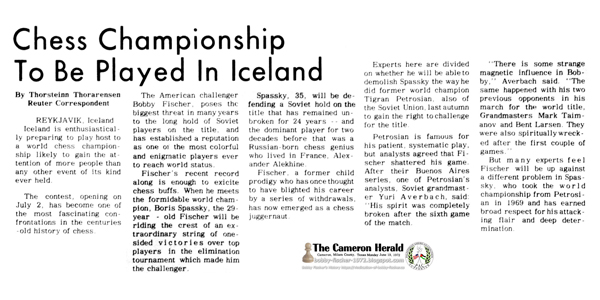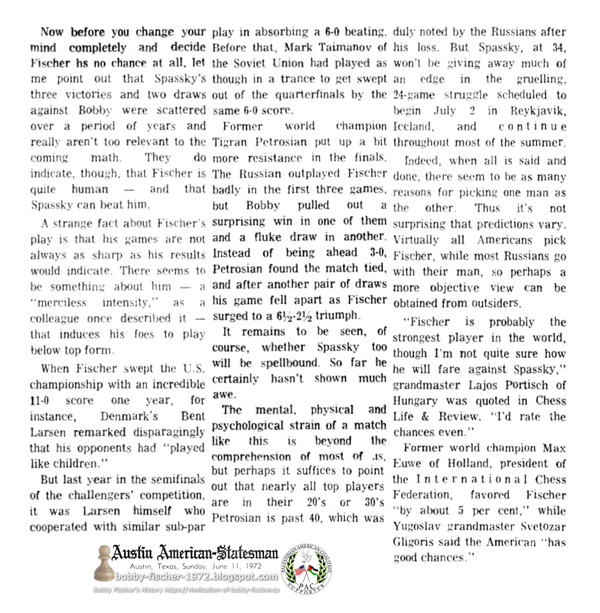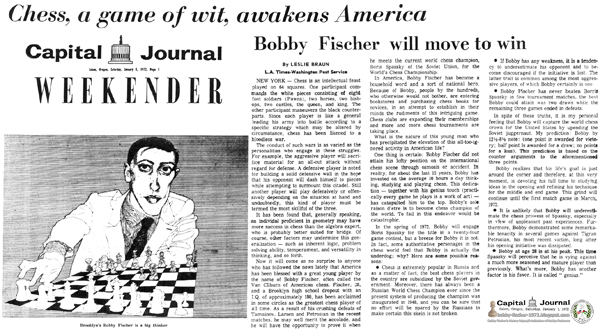The Capital Times Madison, Wisconsin Friday, June 30, 1972 - Page 21
State Champ to Analyze World Chess Match by Peter Dorman
(Editor's Note: Peter Dorman, a U.W. graduate who now lives in Madison, is the Wisconsin state chess champion. He will contribute occasional articles to The Capital Times sports pages analyzing the world chess championship match that starts Sunday between Bobby Fischer of the U.S. and Boris Spassky of the Soviet Union.)
(Wisconsin State Chess Champion)
Sunday, July 2 is the scheduled beginning of the most dramatic contest in chess history: Bobby Fischer, former child prodigy whose play sometimes approaches absolute perfection, finally gets his crack at the world championship.
It's been a long time coming. Fischer first gained national attention in his early teens, when he won a spectacular game from Robert Byrne, one of America's best. Bobby, just 13 at the time, gave up his queen for a knight and a bishop in a long forced series of moves. A year later he won his first U.S. Championship.
Fischer's first stab at the world championship was back in 1958, when he was 15. With the death of the legendary Alexander Alekhine at the end of the Second World War, FIDE, the international chess federation, established a regular 3-year cycle for the world title. They divided the world into zones, each to hold its own championship. Then the top players would play in a worldwide interzonal tournament. The finalists from this event, plus the runners-up from the previous cycle. would compete in a candidates' tournament, and the winner of the final contest would play the reigning world champion in a 24-game match.
Mikhail Botvinnik, a Russian, became the world champion after a special tournament in 1948. He successfully defended his title against David Bronstein and Vassily Smyslov, both Russians, in 1951 and 1954. Botvinnik lost to Smyslov in 1957, but won his title back a year later in a return match.
Since the U.S. Championship suits as a zonal tournament, Fischer played in the 1958 interzonal. He qualified, but fell short in the candidates tournament, which was won by Mikhail Tal—another Russian. Tal's brilliant attacking style gave him the world championship in 1960, but Botvinnik took it back with another return match.
As the next cycle began, it looked like Fischer was destined to break the Soviet spell. He was regularly clobbering his rivals in the U.S., and he placed a clear first in the 1962 Stockholm interzonal. But he could only take fourth place in the candidates' tournament in Curacao that year, finishing behind three Russians.
This defeat provoked his famous charge that the Russians were “fixing” international chess. He claimed that they arranged to draw with each other, and then ganged up to defeat the only serious non-Russian challenger, Fischer.
There may be some truth to this accusation. Some of the games played between the Soviet masters show little indication of a fight; some games were drawn in the opening. But the real cause of Fischer's set-back was that the top Russian players could still beat him more often than he could beat them. Bobby was good, but not yet good enough.
Behind his public posturing, Fischer came to this conclusion himself. His appearances became less frequent; for a while, he disappeared altogether. He was boning up for a comeback.
Meanwhile, there was a new world champion, Tigran Petrosian. His was a bloodless style of chess, relying on slow maneuvering. He rarely took any risks. He rarely lost. In addition, FIDE, acting on a recommendation of Fischer's, scrapped the candidates' tournament and replaced it with a series of elimination matches.
Then Fischer came back. With one victory after another, he seemed to be on his way to the top. But he got into a personal quarrel with the directors of the Interzonal tournament in Tunisia in 1967 over scheduling questions. Even though he was far ahead of the rest of the field, Bobby dropped out. Before long, he was in seclusion once again.
Fischer surfaced in 1970 to play in a team match that pitted the best players from the Soviet Union against the best from all the other countries combined. By this time, Petrosian had lost his title to Boris Spassky, but it was Petrosian that Fischer played. Bobby won two games and drew the other two, a decisive victory against the former world champion.
Then Fischer took the interzonal tournament at Palma De
(Continued on 2nd Sports Page)
Chess Match
(Continued from Page 1, Sports)
Mallorca, winning the last seven games in a row and finishing far ahead of everyone else. Then the elimination matches: Fischer plays Mark Taimanov, a leading Russian master, and wins six out of six. Next in line was Bent Larsen, second only to Fischer among non-Soviet players. Again, Bobby wins six out of six. Finally, Fischer faces Petrosian again, and, after a shaky start, takes the match with five wins, one loss, and three draws. These scores are particularly impressive in view of the fact that most games between the strongest players end in draws.
Now only one player stands between Fischer and the world championship: Boris Spassky. The world champion has done well against Fischer in the past: of the five games they have played, Spassky has won three and drawn two. So far, just pulling together the details of the match has been a formidable problem. Fischer wanted to play in Belgrade, Yugoslavia where he is idolized by thousands in that chess-crazy country. Belgrade had also put in the highest bid, offering cash prizes of $152,000, an unprecedented figure in tournament chess. Spassky wanted to play in Reykjavik, Iceland, where the climate is similar to that of the champion's native Leningrad.
The FIDE decision was a compromise: half of the match in Belgrade, the other half in Reykjavik. But Fischer got into a dispute with the Belgrade organizers, and the Yugoslavs pulled out. Now the entire match is slated for Iceland, with the total prize fund slightly under $100,000.
The best-of-24 game match is due to begin Sunday. Spassky is in Reykjavik, accompanied by his official “second”, Evim Geller. (In the past, Spassky's second has always been the veteran Bondarevsky. The switch is said to be caused by “difficulties”. What are they? The Russians aren't talking.) Two other companions are chess experts Krogius and Nei. Nei is also a psychologist.
Fischer complains about the lighting, which was installed to facilitate the television crews from different countries.
As of now, the match is officially on. but no one knows for sure if Fischer will blow his big chance by refusing to play at the last moment. If he does play, millions of chess fans around the world will see ten years of suspense resolved in a two-month display of unparalleled mental combat.



































